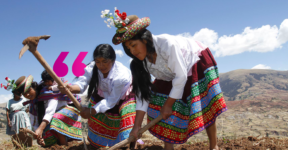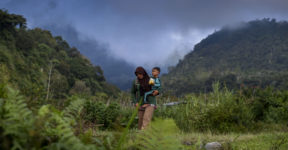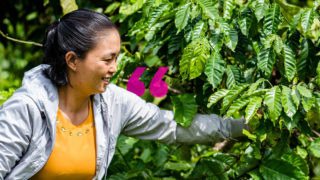
Forest Voices: 'We must respect the boundary between farm and forest.'
Trieu Thi Chau leads a coffee cooperative in Vietnam’s central highlands – a region severely impacted by agriculture-related deforestation. A staunch advocate of sustainable farming, Chau wants more guidance and support for coffee farmers to continue their trade responsibly. Now that the international community is considering regulations to reduce deforestation in supply chains, what will this mean for smallholder farmers like Chau?

Photo: Quinn Mattingly/Panos Pictures/Unfold Stories.
'Last night it rained for the first time in five months. The dry season went on for a long time this year – months without water – but last night it rained. The plants have water and we are all so happy.'
Trieu Thi Chau is a farmer and community leader from Dak Lak province, in the heart of Vietnam’s central highlands, a mosaic landscape of forests and agricultural land.
Chau’s farm is within the Cu Sue Commune. She grew up in this village and has farmed the land all her life. In 2016, she established a cooperative made up of 27 households in the local area and all ethnic minority farmers from the Dao people like Chau herself.
Since then, Chau has been responsible both for managing her own farm and the cooperative, negotiating fair prices for the cooperative’s produce and training its members in better agricultural practices.
For Chau, coffee is a way of life. 'It has a long history here,' she says. 'Coffee is very crucial. It’s central to our community.'
In Vietnam’s highlands, coffee has been grown for centuries, beginning with French colonization in the 1850s. 'Coffee is very easy to cultivate in this particular region in terms of land and soil conditions,' Chau explains.
'My parents’ and grandparents’ generation were brought here to the central highlands by the French. They were taken from their home villages to work in the coffee plantations when they were just teenagers.'
Following the war and subsequent reunification of Vietnam, economic reforms in the 1980s saw many farmers granted control of the coffee plantations that their ancestors had once worked. 'We’ve just taken over from the previous generations,' says Chau.
But, in recent years, coffee farming communities have had to contend with extended periods of drought as a direct result of climate change. The dry season in the central highlands is meant to last from November until April but the rain has taken longer and longer to arrive.
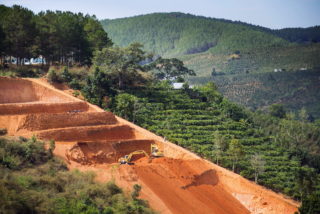
Image – Diggers clear land to plant coffee crops on a hillside in Vietnam. Photos: josefkubes/Shutterstock.
Climate change projections indicate that Vietnam will face longer and more severe droughts in future with some estimates suggesting that, in Dak Lak province, the land suitable for growing coffee could shrink by up to 50 per cent as a result of hotter and dryer weather.
In addition, at the same time as being impacted by climate change, coffee farmers are also contributing to it through clearing forests for agricultural land.
Ultimately, these farmers are caught between twin pressures: the need to make a living and the impact of their farming on the climate and the landscape they inhabit.
Chau’s is just one of the 600,000 households who produce coffee in Vietnam. In just a few decades, the crop has become a backbone of Vietnam’s economy and the nation is now the world’s second largest exporter after Brazil.
Indeed, coffee production contributes USD 3 billion to the Vietnamese economy every year and helps provide a living for millions of people.
Farming is fundamental to the economic prosperity of rural communities and coffee crops help Vietnam’s farmers pay for vital services like education and healthcare.
What’s more, at least half of domestic coffee trading companies are led by women, and a significant proportion are operated by ethnic minorities, making the industry an important vehicle for social equity.
But the country’s coffee boom has also left a mark on Vietnam’s forests. As the global demand for coffee increases, more and more trees are being cleared for farming.
The area of land planted with coffee increased by 21 per cent between 2010 and 2018, and with global demand expected to surge by up to 163 per cent by 2050, this trend is likely to continue.
Image – Before and after satellite pictures show the erosion of forest land in Vietnam’s central highlands between 1984 and 2020.
Phuc Xuan To, a senior policy analyst with Forest Trends, highlights the pressure that global demand can place on forest lands.
'If the commodity price on the global market accelerates, there are risks of forest conversion, both illegally and legally,' he says.
'Forest conversion into coffee plantations in the 2000s in Vietnam is a typical case in point.'
In just 10 years, the forests of the central highlands were depleted by 32 per cent between 2005 and 2015, largely due to commercial agriculture, including coffee farming.
On a global scale, the impact of coffee farming is equally concerning. Coffee production is an important driver of deforestation in a number of countries including Indonesia, Peru, Nicaragua and Honduras.
At the centre of this is the producers themselves. According to the Fairtrade Foundation, 80 per cent of the world’s coffee is produced by 25 million smallholders. Finding a way forward for coffee production means balancing their needs with the global imperatives of protecting ecosystems and tackling climate change.
Coffee is just one of the crops that is driving deforestation around the world.
Forest risk commodities (FRCs), that is, products that are linked with deforestation, also include palm oil, cocoa, timber, beef and other goods. It has been estimated that between 2013 and 2019, 60 per cent of tropical forest loss was driven by the production of agricultural commodities – nearly 70 per cent of which was illegal. This is estimated to account for 58 per cent of global agriculture-linked deforestation.
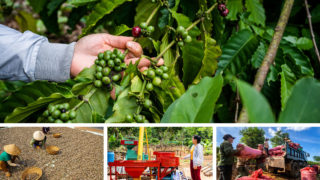
Image – Vietnamese coffee farmers prepare the crops to sell on. Vietnam’s coffee market provides a livelihood for over 600,000 smallholder farmers. Photos: Quinn Mattingly/Panos Pictures/Unfold Stories, Sarah Nguyen & Nguyen Quang Ngoc Tonkin/Shutterstock.
In response to this, there have been a number of moves by consumer countries towards legislation on this issue including in the US, EU and the UK. While these differ in their approaches – some will focus only on illegal deforestation while others will likely call for zero deforestation – broadly they will require companies to perform due diligence to ensure that certain agricultural products they are importing or selling are not linked with deforestation.
The details underpinning these laws are still being determined but the consequences are likely to be significant. Combined, the US, EU and UK made up approximately 62 per cent of the coffee market in 2018 and so their legislative efforts have the potential for substantial impact. As Phuc observes, export countries have a profound influence on production practices.
'Most of the coffee produced in Vietnam is for export,' he says. 'So the country’s coffee sector is strongly shaped by export market demand and requirements.'
Image – Vietnam’s 2019 coffee exports to other countries around the world. Photo: ©Chatham House, The Royal Institute of International Affairs, 2020.
But while FRC regulations are likely to generate a renewed push for protecting forests from coffee production, passing the laws is only the first step. Creating lasting change will require reform at every level of the supply chain.
Many leading export nations face a range of obstacles to implementing supply chain traceability and to meeting the demands of international markets.
Unclear legal and policy frameworks, as well as weak enforcement, often present challenges, as does the sheer number of smallholders involved.
In Vietnam – as with many producer countries – laws already exist to prevent agriculture-linked deforestation. The problem, however, is enforcing them. There has been a moratorium on any new clearing of natural forest in the country since 2016 and an action plan put into place in 2017 commits to improving governance over forest areas and strengthening law enforcement.
'We are enforcing policies and regulations to prohibit deforestation for agricultural and coffee cultivation,’ explains Dr Tran Cong Thang, director general of the Institute of Policy and Strategy for Agriculture and Rural Development (IPSARD). ‘We need to continue in this direction in order to stop encroachment on forests to expand coffee growing areas.'
For Chau, enforcement is also one of the key issues standing in the way of more sustainable farming. 'It’s so important to implement the laws but that doesn’t always happen,' she explains.
'I've seen cases of people taking part in practices that are against regulations but nothing is done.'
'Ultimately, it requires the government to champion these laws and actively ensure that everyone follows them.'
However, many smallholders face obstacles in complying with the law, as Phuc explains. 'Many producers – particularly smallholder growers – just do not know about legal sustainability requirements from export markets.'
'Producer country governments should have clear requirements and communicate these requirements well to all actors engaged in supply chains.’
‘Resources should also be allocated to support marginalized actors, particularly smallholder coffee growers, in order to bring them up to standard.'
Ultimately, governments need to create a favorable business environment for all those involved in coffee production particularly smallholders. This means ensuring that regulations are clear and easy to follow and that laws are enforced consistently and fairly.
Any solution to the problem of agriculture-linked deforestation must place smallholders at the forefront of policies, ensuring that farmers, like Chau, are empowered to produce their products in a sustainable and economically-viable way.
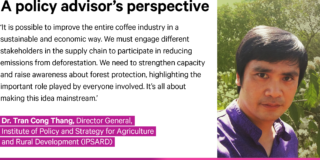
Coffee is not an inherently environmentally unfriendly product. The crop can be, and often is, produced sustainably.
'The most effective means of safeguarding the environment, while also protecting the Vietnamese coffee industry, is to widely apply sustainable agroforestry models on coffee plantations as part of a landscape approach to land management,' explains Thang.
This approach, he says, includes intercropping and other techniques for maximizing value without encroaching into forest lands.
Intercropping coffee plants with other types of crop, like avocado or bananas, can improve soil conditions and carbon absorption while enhancing the local ecosystem which in turn benefits the farming community.
Chau already champions the importance of such techniques by training other local farmers in these sustainable practices. 'In my community, we are very well aware of the importance of nature. We are careful with the environment. We don’t chop down woodland and we respect the boundary between the farm and the forest.'
Chau has seen the impact of techniques like intercropping on production in her own cooperative too. 'All the households in our cooperative have planted many shade trees in the coffee gardens,' she says.
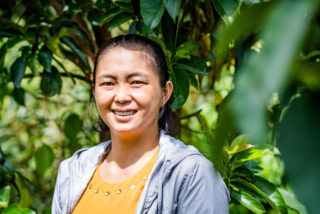
Image – Chau alongside her crops on the farm in Dak Lak province. Photo: Quinn Mattingly/Panos Pictures/Unfold Stories.
'In terms of economics, the community is able to withstand price drops in coffee because they have other products.'
Chau strongly believes that other smallholders could benefit from the approach as well. 'This model of farming should be duplicated in all the provinces,' she says. 'I’ve seen the concrete benefits.’
'These farming techniques are better for farmers, communities and for the environment.'
Ensuring responsible coffee production requires more than just mandating it to be so. It also requires that producers have the financial support, training and will to work in a different way.
Smallholders often live precariously with limited financial resources, education or assets. To place the burden of compliance on them without support or assistance would be both unjust and ineffective.
Thang acknowledges the importance of more extensive training in farming techniques and better education for smallholders on sustainable farming. 'We’re working to increase the income of coffee growers on existing cultivated areas through technical assistance,' he says.
'Awareness-raising is also vital. We need to ensure that farming communities are well informed about the importance of forest protection and that they are bought into the process.’
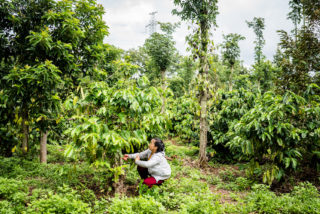
Image – Chau practices a technique known as intercropping where coffee plants are interspersed with other types of crop. Photo: Quinn Mattingly/Panos Pictures/Unfold Stories.
'This means championing strategies for improving income and livelihoods for coffee-producing households so that they aren’t pressured to expand agricultural production into forest lands.'
In future, Chau wants to see government play an increasing role in educating smallholders both on the importance of forest protection and on the best techniques for increasing yields without expanding farmland.
‘Perhaps the government could provide systematic training courses in this area so that every household is on the right track,' Chau says.
'We need support from experts, telling us how to improve current practices and we need to understand that there are techniques that ensure the environment can be improved without reducing smallholders’ profits.'
To prevent deforestation in the coffee industry, there needs to be greater dialogue between all those in the supply chain.
'Understanding the entire supply chain is key for mitigating deforestation risks and this can only be achieved through strong connections between the different actors. I think much more effort should be made to facilitate this connection,' says Phuc.
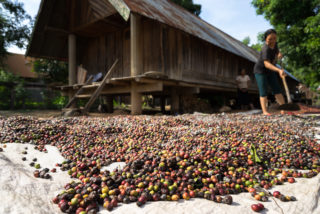
Image – A coffee farmer prepares beans to dry in the sun. Photo: Vietnam Stock Images/Shutterstock.
'Many smallholders do not know about the regulations coming from export markets, but at the same time, consumers in export markets don’t know much about the practices associated with commodity production. Some efforts have been made to connect producer and consumer countries around these messages but more needs to be done.'
Regulations in consumer countries are a vital step towards supporting sustainable production but they must take into account the requirements and perspectives of all stakeholders in the supply chain.
The success of efforts to reduce the impact of agricultural production on forests will depend on collaboration between governments, companies and smallholders to create systems that work for everyone.
'I really wish that the people buying our coffee could have a better knowledge of how coffee farmers live here in the community,' says Chau.
'I’d like people reading this story to try and understand the nature of our lives here so that they can empathize more with us.’
'I want them to have a better appreciation of how we are connected.'
Sustainable coffee farming has a vital role to play in supporting vibrant rural economies that are able to both withstand and help mitigate climate change.
- Import regulations to promote responsible production and trade could be a valuable tool in global efforts to tackle deforestation. But, if they are to fulfill this potential, inclusive dialogue is needed with all those along the supply chain to ensure their different priorities are taken into account.
- In developing and implementing measures to reduce deforestation in supply chains, governments from producer and consumer countries need to work closely together. This will enable them to identify issues of common interest and ways to advance shared agendas.
- Good governance of land-use and agriculture is essential if measures to tackle deforestation are to be effective. As a priority, producer country governments need to ensure there is legal clarity and enforcement of the law. The donor community has an important role to play in supporting those countries with weak governance too.
- Smallholders, who produce most of the world’s coffee, are at most risk of being negatively impacted by policy changes. Measures should be taken to safeguard their livelihoods including providing adequate technical support so that they are not excluded from any new market requirements and that they can continue to drive sustainable rural development. Producer country governments, donors and multinational companies all have a role to play in the provision of this support.
This new set of stories aims to draw attention to the critical importance of good forest governance for achieving global commitments on biodiversity, climate change and poverty eradication. Through personal perspectives on a variety of approaches from around the world, the series seeks to highlight some of the lessons learned so far and what further action will be needed at the UN’s COP26 climate conference in November 2021 and beyond.
-------------
Produced by Unfold Stories.
Written by Mary Cruse. Researched by Iain Alexander. Graphics by Alex Sommers. Production by James Lovage.
The views expressed in this article are those of the experts interviewed and not of Chatham House.
